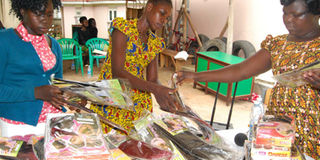Hope as South Sudan refugee girls start own businesses

Making ends meet. Ms Viola Jokudu (left) and Ms Annet Sikina (centre) attend to a customer at their salon in Rhino Camp refugee settlement last Friday. PHOTO BY FELIX WAROM OKELLO
What you need to know:
- Another refugee girl, Ms Wasima Sadik, 24, who stays with five siblings in Ocea in Rhino Camp said: “When we reached Rhino Camp, it was not easy because it was congested. We were given a plot to construct a house, but we never had adequate meals. We had to sell some of the food in order to buy sanitary pads or soap.”
ARUA. South Sudan refugees living in camps depend on handouts such as cash donations and food rations from the government, international donors and other well-wishers.
But while such donations are helpful, they are unable to address their growing needs.
To supplement the donations, South Sudanese girls aged between 16 and 25 have undertaken an initiative to set up income generating activities.
Several of them shared with Daily Monitor their success stories of how they have been able to invest savings from cash donations to improve their livelihood.
Ms Viola Jokudu, 22, is one of those who have started income generating activities.
She established a salon at Rhino Camp in Arua District, which has a population of 86,392 South Sudan refugees.
The South Sudan nationals fled their homes in March last year when the Sudan People’s Liberation Army (SPLA) forces launched a manhunt for several militia groups in Imatong State.
Speaking to Daily Monitor on Friday, Jokudu tearfully narrated how she was separated from her family in South Sudan and how she has been able to eke a living.
“I fled with only one piece of cloth I was wearing in 2015. I am an orphan currently staying with my aunt. Life in refugee camps is hard, especially for me who is an orphan,” a teary Jokudu narrated.
With support from donors, she started a saloon where she earns a profit of Shs30,000 on a good day.
She uses part of the money to address her family needs and the balance is saved on to her account.
“I keep part of the profit to cater for the five siblings I am taking care of. I want to save money in order to pay school fees for the siblings in future. And out of the money, we are able to buy enough food. Before, we only depended on food rationing from World Food Programme,” she said.
Recently, a local non governmental organization, Rural Initiative for Community Empowerment (RICE-WN), initiated a programme to help the girl child caught up in war situation.
The selected beneficiaries underwent a five-month training at Flaminio Vocational Training institute in Arua.
The project officer of RICE-WN, Ms Mildred Ocokoru, said the organisation is supporting 29 girls affected by war.
“We thought that with the trainings, this would offer the girls opportunity to develop their skills in tailoring, catering and hotel management, agriculture and hair dressing, which knowledge they could impart to other refugees who have lost hope. Emphasis is on starting their own businesses so that they become self-reliant,” she asserted.
Ms Annet Sikina, who lives in Koboko District, said: “I have no biological parents. My father died when I was seven years and life has been very difficult for me. I did not know I could meet some basic needs, but the salon has helped me start a new life with hope.”
The girls have been given full sets of start-up kits with funding from Global Fund for Children.
Another refugee girl, Ms Wasima Sadik, 24, who stays with five siblings in Ocea in Rhino Camp said: “When we reached Rhino Camp, it was not easy because it was congested. We were given a plot to construct a house, but we never had adequate meals. We had to sell some of the food in order to buy sanitary pads or soap.”
Wasima excelled from Institute of Agriculture with a first class certificate. She is now rearing goats.



